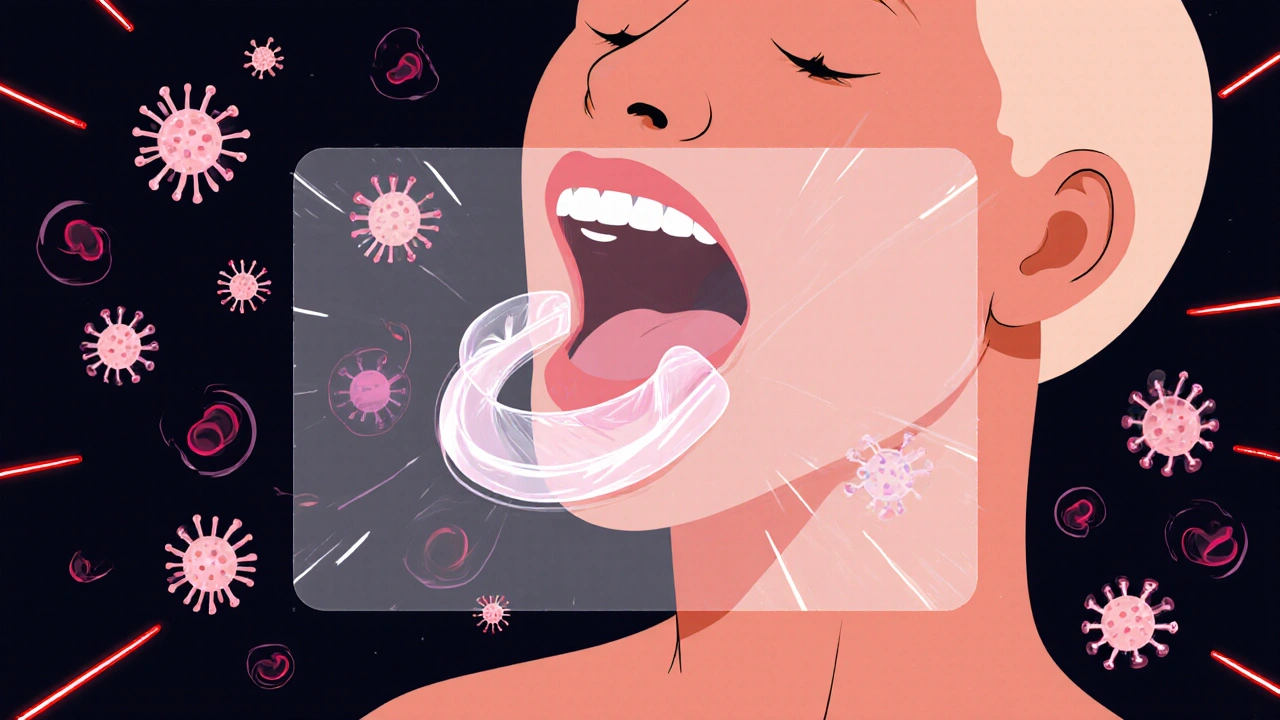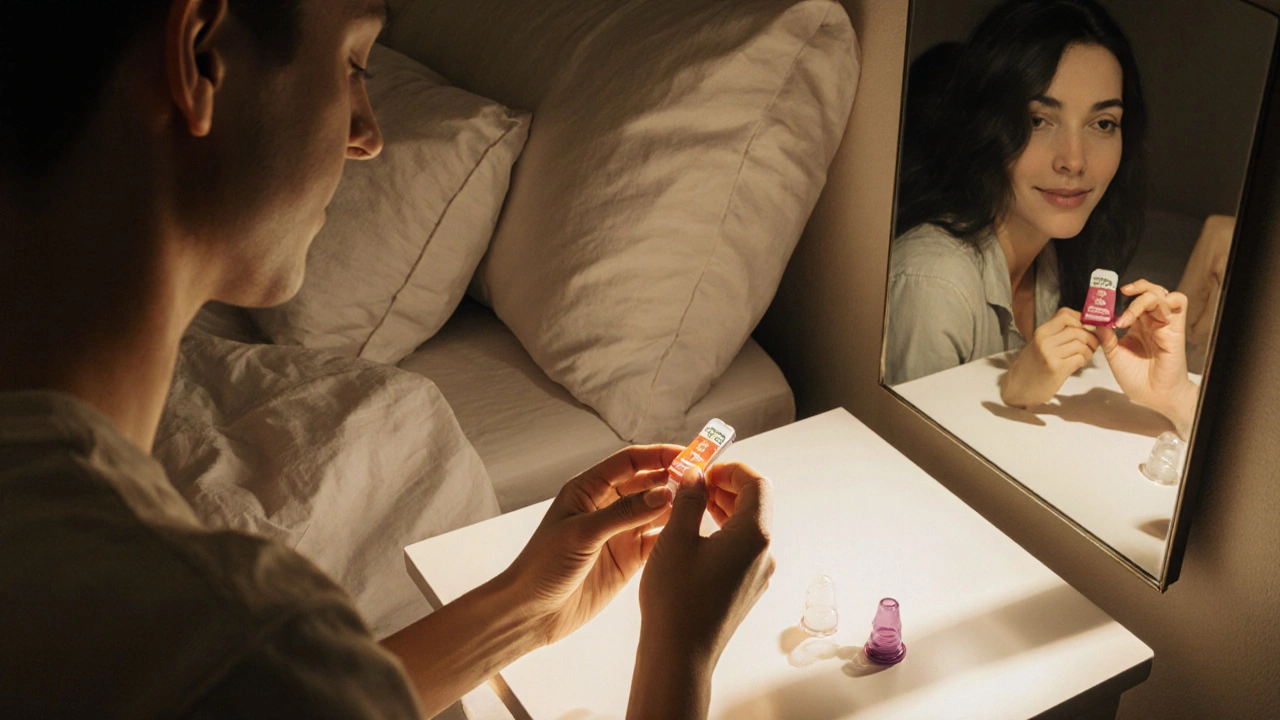You’ve heard the myth: oral sex is safe because there’s no pregnancy risk. But that doesn’t mean it’s risk-free. In fact, unprotected oral sex can expose you to more than you think-especially if you’re not checking your partner’s status or skipping barriers like dental dams or condoms. If you’ve ever wondered whether licking or sucking is truly safe, you’re not alone. Millions of people assume it’s low-risk, but the truth is more complicated-and more urgent-than most admit.
What You’re Actually Exposing Yourself To
Oral sex without protection means your mouth, throat, or tongue is in direct contact with bodily fluids: semen, vaginal fluid, or blood. These fluids can carry viruses and bacteria that cause infections you might not even feel right away.
Here’s what’s actually on the table:
- Chlamydia - Can infect the throat silently. No symptoms? Doesn’t mean it’s gone.
- Gonorrhea - Often called the "clap," it thrives in the throat. Up to 90% of throat infections show no symptoms.
- Herpes (HSV-1 and HSV-2) - Cold sores on the lips? That’s HSV-1. It can spread to the genitals during oral sex-and vice versa.
- HIV - The risk is lower than vaginal or anal sex, but it’s not zero. Open sores, bleeding gums, or recent dental work increase exposure.
- HPV - Linked to throat and mouth cancers. The CDC says HPV causes about 70% of oropharyngeal cancers in the U.S., and many cases come from oral sex.
- Syphilis - Can form painless sores in the mouth or on the genitals. You might not notice until it’s advanced.
These aren’t theoretical risks. A 2023 study in the Journal of Sexual Health found that 1 in 6 young adults aged 18-25 in the UK had an oral STI without knowing it. No symptoms. No testing. Just silence.
Why People Think It’s Safe (And Why They’re Wrong)
It’s easy to believe oral sex is harmless. After all, you don’t need birth control. No pregnancy. No visible signs. But that’s exactly the trap.
Think of it like driving without a seatbelt. You might never get in an accident. But if you do, the consequences are way worse than you expected. Same here.
Many people think:
- "My partner looks healthy." → STIs don’t have a look. Most are invisible.
- "We’re monogamous." → Did you both get tested recently? Even one past partner can leave a trace.
- "I’ve done this before with no issues." → That’s luck, not immunity. Each encounter is a new roll of the dice.
There’s also a cultural blind spot. Movies, porn, and even sex education often skip the protection part. It’s treated like a casual kiss. But your mouth isn’t just for kissing-it’s a gateway.
Who’s Most at Risk?
Anyone can get an STI from unprotected oral sex. But some groups face higher odds:
- People with gum disease or mouth sores - Bleeding gums or cuts let viruses slip into your bloodstream easier.
- Those who perform oral sex on multiple partners - Each new partner increases exposure.
- Men who have sex with men (MSM) - Throat gonorrhea and chlamydia rates are significantly higher in this group, according to Public Health England data.
- People under 25 - Younger adults are less likely to use protection during oral sex and less likely to get tested regularly.
It’s not about who you are-it’s about what you’re doing and whether you’re protecting yourself.

How to Protect Yourself (Without Ruining the Mood)
You don’t have to give up oral sex to stay safe. You just need to make smart choices.
Here’s how:
- Use a condom - Flavored condoms are designed for oral sex. They’re thin, tasty, and block fluids. Keep them handy.
- Use a dental dam - A thin latex or polyurethane square placed over the vulva or anus. Not sexy? Try putting it on together. Turn it into part of the moment.
- Get tested regularly - If you’re sexually active, get tested every 3-6 months. Ask for oral swabs. Most clinics offer them for free in the UK.
- Talk to your partner - Say it plainly: "Have you been tested lately?" or "Want to use a barrier?" It’s not awkward-it’s respectful.
- Avoid oral sex if you or your partner have sores, cuts, or infections - Even a small cold sore can spread herpes.
These aren’t restrictions. They’re tools. Like wearing a helmet when biking. You’re not giving up the ride-you’re making sure you finish it.
What to Do If You Think You’ve Been Exposed
Let’s say you had unprotected oral sex and now you’re worried. First: don’t panic. Second: act fast.
- Don’t wait for symptoms. Most STIs don’t show signs right away-or ever.
- Visit a sexual health clinic. In London, you can walk into any GUM clinic without an appointment. They’ll swab your throat, take a blood test, and give you results in days.
- Ask for post-exposure prophylaxis (PEP) if it’s been less than 72 hours. PEP can prevent HIV if taken quickly after exposure.
- Tell your partner. It’s hard, but necessary. You’re not blaming them-you’re protecting them too.
Testing is free, confidential, and quick. No judgment. No shame. Just care.

Oral Sex With vs. Without Protection: A Quick Comparison
| Factor | With Protection | Without Protection |
|---|---|---|
| STI Risk | Very low (if used correctly) | Significant risk for chlamydia, gonorrhea, herpes, HPV, HIV |
| Symptoms | Unlikely to develop | Often silent-no warning until damage is done |
| Long-Term Health | Minimal risk of cancer or chronic infection | Increased risk of throat cancer (HPV), infertility (untreated chlamydia) |
| Partner Trust | Builds mutual respect and safety | Can lead to guilt, secrecy, or resentment |
| Availability | Free at clinics; cheap at pharmacies (£1-£3) | None |
Frequently Asked Questions
Can you get HIV from oral sex?
Yes, but it’s rare. The risk is much lower than with vaginal or anal sex. However, if your partner has a high viral load, you have open sores in your mouth, or there’s blood involved, the risk increases. Using a condom or dental dam reduces it to nearly zero.
Does using a condom during oral sex reduce pleasure?
Some people think so-but many don’t notice a difference. Flavored condoms are designed to enhance sensation, not dull it. And if you’re worried about feeling less, try different brands or textures. The trade-off? You avoid a lifelong infection. That’s worth a little adjustment.
Can you get an STI from kissing?
Yes-specifically herpes (HSV-1). If your partner has a cold sore, avoid kissing or oral sex until it’s fully healed. Even without visible sores, the virus can be shed. But kissing alone rarely spreads chlamydia or gonorrhea.
Is oral sex safer than vaginal or anal sex?
In terms of pregnancy risk, yes. But when it comes to STIs, it’s not safer. Many people assume oral is low-risk, but throat infections from gonorrhea and chlamydia are rising fast. HPV linked to throat cancer is now more common than cervical cancer in some areas. Protection matters regardless of the act.
Where can I get free STI testing in London?
Every borough in London has a free sexual health clinic. You can walk in without an appointment. Try clinics like the London Sexual Health Clinic (Soho), the Royal Free Hospital, or local community centers. All offer throat swabs, blood tests, and confidential counseling. You can also order free home testing kits from the NHS website.
Final Thought: Safety Isn’t Sexy-Until It Is
There’s a myth that being careful kills the vibe. But the truth? The most attractive thing you can do is care-for yourself and your partner.
Using protection isn’t about distrust. It’s about respect. It’s about knowing that real intimacy includes honesty, responsibility, and a willingness to protect each other-even when no one’s watching.
So next time you’re about to go down, ask yourself: Is this worth the risk? And then make the choice that lets you sleep easy-and enjoy it more.









Rahul Verma
November 11, 2025 AT 11:32Been doing this for years and never thought twice until my buddy got diagnosed with throat gonorrhea. Zero symptoms. Just felt a little scratchy and blew it off. Got tested because he mentioned it and boom. Scary how silent these things can be. Now I always use a flavored condom-no big deal, actually makes it nicer. Why risk it?
Jennifer Kettlewell
November 13, 2025 AT 00:22Let’s be real-this isn’t just about STIs. The CDC and WHO are pushing this narrative to funnel more money into pharmaceutical testing infrastructure. Throat HPV? Yeah, it’s linked to cancer, but 90% of people clear it naturally. They’re scaring you to sell you annual swabs and vaccines you don’t need. And dental dams? That’s a corporate product invented by latex manufacturers in the 90s. You’re being manipulated into a medical-industrial complex you didn’t ask for.
Karinne Davidson
November 13, 2025 AT 05:59Honestly? I just started using dental dams after reading this and it felt… sweet? Like we turned it into a little ritual. We pick the color together, laugh about how weird it looks, and it actually made me feel safer and more connected. No pressure, no awkwardness. Just care. 😊
GAURAV JADHAV
November 14, 2025 AT 04:46Statistical manipulation. Throat chlamydia prevalence is 1.7% in young adults. HIV transmission via oral sex is 0.04% per act. Risk is negligible. Fear is the product. Testing is profitable. Protection is optional. The real risk is panic.
Rachel Freed
November 14, 2025 AT 19:23I think the real question isn’t whether it’s risky-it’s whether we’re willing to talk about it without shame. We treat sex like it’s either sacred or sleazy, but the middle ground? That’s where safety lives. It’s not about fear. It’s about showing up for each other, even in the quiet moments. A condom isn’t a barrier to intimacy. It’s a bridge.
Susan Scott
November 15, 2025 AT 06:33bro i used to think dental dams were for people who watched too much public health PSAs until i tried one and it felt like a silk scarf with flavor. also my partner said it made her feel seen. who knew protection could be sexy? also i got tested last week and the nurse gave me a lollipop. yes, this is my life now.
Jeff Brainard
November 16, 2025 AT 23:02Protection isn’t about trust it’s about control. We’re taught to fear our bodies instead of understand them. The real danger isn’t the fluids it’s the silence we’ve been trained to keep. Break the silence. That’s the only real barrier that matters